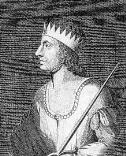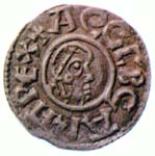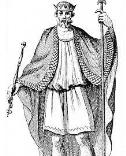See also
- (Daughter KENT)'s father: Arthelbert II KING OF KENT ( - )
(Daughter KENT) ( - )
1. (Daughter of Aethelbert II, King of KENT), daughter of Arthelbert II KING OF KENT ( - ), married Ealhmund KING OF KENT.
Ealhmund KING OF KENT (also known as Alemund, Ealmund), son of Eafa KING OF WESSEX ( - ) and (A Kentish Princess) ( - ), died in 0786. He and (Daughter of Aethelbert II, King of KENT) had the following children:
| +2 |
Second Generation
2. Egbert KING OF WESSEX, son of Ealhmund KING OF KENT and (Daughter of Aethelbert II, King of KENT), was born in 0770 in Wessex. He died on 4 February 0839 in Cornwall. He was buried in Winchester Cathedral. He married Redburga.
reigned from 802-839.
Egbert (also Ecgbehrt or Ecgbert) (c. 770 — July 839) was King of Wessex from 802 until his death. Under Egbert, Wessex rose to become the most powerful of the Anglo-Saxon kingdoms, overthrowing the supremacy of Mercia.
A somewhat difficult question has arisen as to the parentage of Egbert. Under the year 825, the Anglo-Saxon Chronicle states that in his eastern conquests Egbert recovered what had been the rightful property of his kin. The father of Egbert was called Ealhmund, and we find an Ealhmund, king in Kent, mentioned in a charter dated 784, who is identified with Egbert's father in a late addition to the Chronicle under the date 784. It is possible, however, that the Chronicle in 825 refers to some claim through Ine of Wessex from whose brother Ingeld Egbert was descended.
After the murder of King Cynewulf in 786, Egbert may have contested the succession, but the throne went to Beorhtric, an ally of Offa of Mercia. Starting probably in 789, Egbert went into exile after being expelled by Offa and Beorhtric. He spent this exile with the Franks on the continent, and although it is said to have lasted three years, some historians have suggested that this period may have actually lasted thirteen years (789–802), as this would account for Egbert's whereabouts during the whole period preceding Beorhtric's death.
Beorhtric ruled subject to the Mercian kings (Offa and, from 796, Coenwulf), and Egbert probably sought greater independence for Wessex. He was acknowledged as king by the West Saxons following Beorhtric's death in 802, but on the same day as his accession to the throne, Æthelmund, earl of the Hwicce, led a raid into Wessex. Æthelmund was defeated and killed by Weoxtan, earl of Wiltshire, who also lost his life in the battle.
In 815 Egbert ravaged the whole of the territories of the West Welsh, which probably at this time did not include much more than Cornwall; it is probably from his reign that Cornwall can be considered subject to Wessex. The next important occurrence in the reign was the defeat of Beornwulf of Mercia at a place called Ellandun in 825. After this victory, Kent, Surrey, Sussex and Essex submitted to Wessex; while the East Anglians, who rose against Mercian rule and slew Beornwulf shortly afterwards, acknowledged Egbert as overlord. In 829 the king conquered Mercia, and Northumbria accepted him as overlord after refusing to fight his forces at Dore (now a suburb of Sheffield). In 830 he led a successful expedition against the Welsh, and it was in the same year that Mercia regained its independence under Wiglaf, although it is uncertain whether this was achieved through a rebellion or was the result of a grant by Egbert to Wiglaf. In 836 Egbert was defeated by the Danes, but in 838 he won a battle against them and their allies the West Welsh at Hingston Down in Cornwall.
Egbert married Redburga, a Frankish princess (possibly a sister-in-law of the emperor Charlemagne), and had two sons and a daughter. Egbert died in about 839, and was buried at Winchester. He was succeeded by his son, King Ethelwulf of Wessex.
The image of Egbert is an imaginary portrait drawn by an unknown artist.
Redburga and Egbert KING OF WESSEX had the following children:
| +3 |
Third Generation
3. Athelwulf KING OF WESSEX, son of Egbert KING OF WESSEX and Redburga, was born in 0795 in Aachen. He died in 0858. He married Osburh.
reigned 839-858.
During his reign Aethelwulf had to content with the growing threat of Danish invasion. In the first half of the ninth century Danish raids had been fierce but not prolonged, but in 850 a sizable army overwintered in England for the first time. Aethelwulf defeated it in the following year at Aclea in Kent. He was clearly a capable military leader for in 853 he was called upon by Burgred of Mercia to defeat the Welsh, but it is likely that he was personally more interested in ecclesiastical matters because in 855 he set of for Rome for a year, leaving his eldest son Aethelbald as ruler of Wessex.
On his way back he was a guest at the court of Charles the Bald, King of the West Franks, and on 1 October 856 he married Charles's 13 year old daughter, Judith. It was probably while in France that he learned of Aethelbald's intention to continue to rule Wessex, despite his father's homecoming. Aethelwulf chose to accept a division of his kingdom, leaving Wessex to his son and taking southeast England for himself. He died in 858.
Four of Athelwulf's sons became kings: Aethelbald, Aethelberht, Aethelred and, most famously, Alfred.
Though apparently one tenth of the Kingdom of Wessex was given to the Church, King Athelwulf was really making a grant out of public land. Such a grant was an actual conveyance of real property rather than a gift of a tithe of the produce of the land.
For which cause, I, Athelwulf, king of the West-Saxons, with the advice of my bishops and nobles, for a remedy thereof have adopted the wholesome expedient of granting forever some portion of my kingdom to God and the holy Mary, and all saints; to wit, a tenth part of my land, free and quit of all secular services, king's tribute both great and small, and the taxations we call witeredden; and for the good of my soul and the remission of my sins, let it be wholly free for the service of God alone, exempt from military service, the building of bridges and castle-ward, to the end that prayers may ascend without ceasing unto God for us, and so much the more diligently as we in aught remit the services of those who offer them....
This charter of donation was written in the year of grace 854, in the fourth indiction, of the ninth day of November, in the city of Winchester, before the greater altar of the blessed apostle Peter.
Osburh and Athelwulf KING OF WESSEX had the following children:
| 4 | Alfred the Great KING OF WESSEX (849-899). Alfred was born in 0849 in Wantage, Berks. He died in 0899. He was buried in Winchester. |


